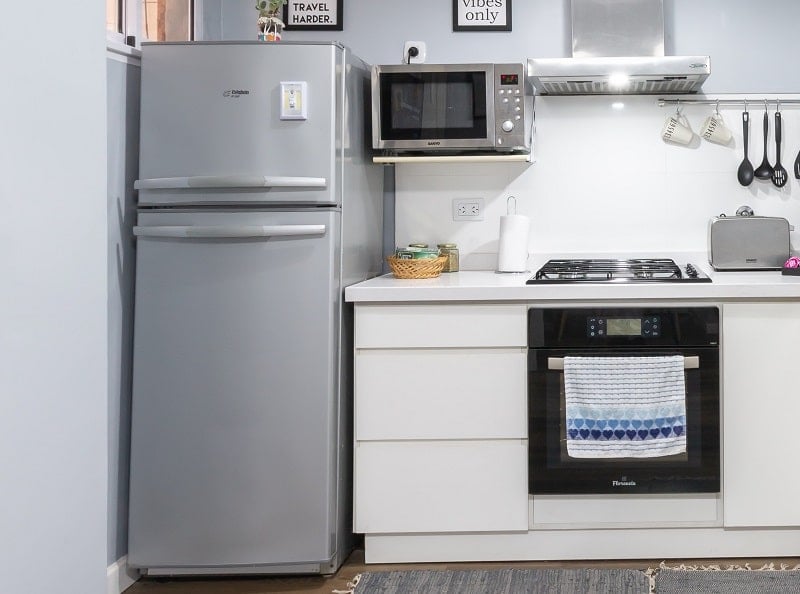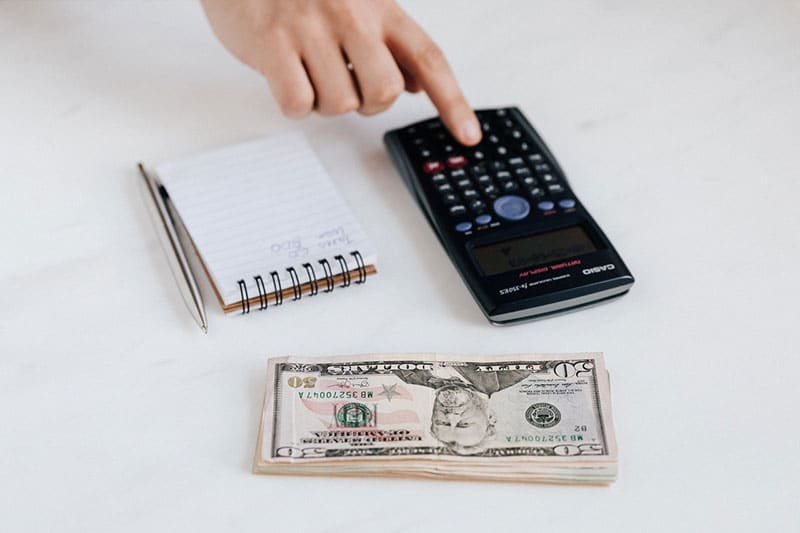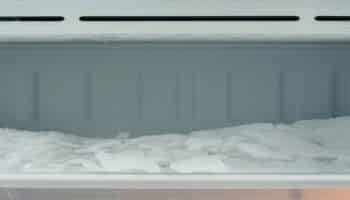Do you ever look at your freezer and wonder how much it’s costing you to run it everyday?
Well – so have I! I have a freezer that’s running practically 24/7, and I wanted to find out how much it’s costing me to run it.
A mid-sized freezer of around 400W will cost around 5c per hour to run, based on an average US tariff of $0.13/kWh. This adds up to around $0.60 per day, which thankfully isn’t too much. This can vary greatly depending on the size of your freezer, how efficient it is, and what the outside temperature is.
That’s a very rough answer, but it’s not hard to find out how much your actual freezer is costing you every hour that it runs.
The easiest way for you to figure out how much power your freezer is going to use is to take a look at the sticker on the back of it. This will let you know exactly how many kilowatt-hours you are going to use every year to keep the freezer cold. Then, you need to take a look at your energy bill to figure out how much you are paying for those kilowatt-hours. From there, you can work some math to figure out how much money you will spend on your freezer.
Of course, this is a lot more complicated than it appears. You need to think carefully about how big your freezer is, how often you run it, whether it has a Variable Speed compressor or a conventional On/Off variant, and how often you clean it. All of this is going to impact the average price of running a freezer.
Are you ready to learn more about the average cost to run a freezer? Take a look at some important points below!
A Small Chest Freezer
The first option you might have for a freezer is called a small chest freezer. This is a freezer that usually sits on the counter. Instead of the freezer taking up an entire spot in your kitchen, you will probably simply put the freezer on the counter. Then, you will put a few items inside the freezer.
Even though this freezer is not necessarily the largest option, it is a cost-effective choice if you are not going to be freezing a lot of products. On the other hand, if you have a lot of food you have to put in the freezer, a small chest freezer is probably not going to be big enough.
On average, a small chest freezer will use approximately 215 kilowatt-hours of electricity every year. This is assuming the freezer is plugged in throughout the entire year. Even though the price of electricity can vary depending on where you are located, this should cost slightly less than $30 per year to run.
Keep in mind that there are a lot of options for small chest freezers. Therefore, you need to think carefully about how big of a freezer you need and how efficient you want the freezer to operate. The more advanced the freezer is, the less electricity it will use. At the same time, this could make the freezer more expensive.
Finally, there is also a chance you may have to upgrade this freezer to a larger model down the road. Think about how long this freezer is going to last.
An Upright Freezer
Another option you might have available is an upright freezer. An upright freezer is probably what you think about when you imagine a freezer. This is something that slides into a slot in the kitchen, providing plenty of space for you to freeze your food.

Again, an upright freezer can vary widely in terms of its overall size. Some of these freezers come attached to a refrigerator while others do not. You might need a free-standing freezer, or you might be looking for one that attaches to a refrigerator.
The average energy usage of a standard upright freezer is approximately 395 kilowatt-hours per year. Even though the price of electricity can vary depending on where you live, it usually costs approximately $50 per year to run. Keep in mind that the efficiency of a freezer can vary widely depending on the type of model you have.
If you have a freezer that is attached to a refrigerator, then you may be interested in breaking down the amount of electricity taken up by the refrigerator versus the freezer. This is something you may need to look at the manual to figure out.
Furthermore, freezers that are old are usually less efficient than freezers that are new. Therefore, if you have an older freezer, it may use more electricity every year. Finally, the larger the freezer is, the more energy it will require. This is also going to play a role in how much money you spend on electricity.
Now, typically chest freezers last longer and are more efficient than upright variants mainly due to their design. When you open an upright freezer, all the cold air the appliance has worked hard to create escapes, whereas, with chest freezers, it stays at the bottom of the unit (cold air sinks).
This means that chest models use less energy and don’t have to work as hard to maintain cool temperatures after being opened.
An Energy-Efficient Model
Finally, there is another option for freezers that usually land somewhere in the middle. You should expect to pay between $30 and $50 per year to use your freezer if you have an energy-efficient model. Keep in mind that an energy-efficient freezer is usually more expensive because it uses a lot of new technology.
You might also be wondering what makes a freezer energy efficient. Generally, a freezer is considered to be energy-efficient if it does a good job of insulating itself. This means that the freezer does not leak as much cold air to the external environment. The freezer might also require less energy to get cold enough to freeze your food.
Because an energy-efficient freezer does not use as much electricity, it should be less expensive to operate. For example, the door seal on an energy efficient might be a bit stronger. Or, there might be smart technology that allows the freezer to automatically adjust how hard it is working based on the amount of food in the freezer.
If you are thinking about getting a new freezer in the near future, you may want to take a look at some energy-efficient options. They come in all shapes and sizes, and you should be able to tailor your freezer to meet your needs. Even though they do cost more money when you purchase them, they will also save you a significant amount of money on your electricity bills every year.

What Factors Impact How Much Electricity a Freezer Uses?
Now that we have covered how much money you need to spend on freezers to run them every year, it is time to take a look at a few factors that might impact just how much electricity the freezer uses. A few of the most important factors that determine how much power the freezer will use include:
- Temperature: The temperature you have your freezer set at is going to play a role in how much electricity it uses. The colder you want the freezer to get, the more power it will require. Therefore, when you turn down the thermostat on your freezer, expect to see your utility bill go up.
- Size: Furthermore, the size of your freezer is also going to impact how much money you spend on electricity every year. The bigger the freezer is, the more power it will require. This is the main reason why an upright freezer is more expensive to run than a chest freezer. Take a look at the manual to figure out how much power the freezer is going to use before you purchase it. If it is a larger freezer, expect to see more power usage.
- Amount of Food: You also need to think about the amount of food you are putting in your freezer. The more food you put in your freezer, the harder your freezer will have to work to keep the food cold (at least until everything’s frozen. Then, maintaining cool temperatures should be much easier). Furthermore, if you place the food in front of the air vent, the freezer will not be able to circulate air appropriately. This will cause the motor to work harder, increasing your utility bill.
- Manufacture Date: You might also want to take a look at the date on which the freezer was made. In general, the older the freezer is, the less efficient it will be. This is why older freezers usually cost more money to run, even though they are less expensive to purchase. If you want to save money on your utility bills, you may want to go with a newer freezer.
- Cleanliness: Next, the cleanliness of your freezer is also going to play a role in how much money you have to spend. You need to keep your freezer clean if you want to reduce your utility bills. If your freezer is dirty, a lot of internal components are going to be obstructed. Furthermore, your freezer will have a harder time circulating air. Keep the freezer clean (especially the condenser coils) if you want to keep your utility bills low.
- Your Location: Finally, your location is also going to impact how much money you spend keeping your freezer operational. Some areas have more expensive electricity rates than others. You may want to take a look at your utility bill to figure out how much you are being charged for electricity. This will make it easier for you to work the math, determining how much money you should expect to spend on your freezer.
These are just a few of the many factors that will play a role in how much electricity a freezer will use. Fortunately, there are also ways you can save money on the electricity your freezer uses.
Learn More About How Much Money It Costs To Run a Freezer
Clearly, there are a lot of factors that will determine how much money you will spend running your freezer.
You need to think carefully about the size of your freezer, the temperature you have it set at, and the area in which you live. All of these are going to play a major role in your utility bills. If you are looking for a new freezer, you should consider its energy efficiency. Even though an energy-efficient freezer might be initially more expensive, it also uses less power. Therefore, you may end up saving money in the long run.
If you have questions about how to find the right freezer to meet your needs, you might want to reach out to a professional who can help you.






